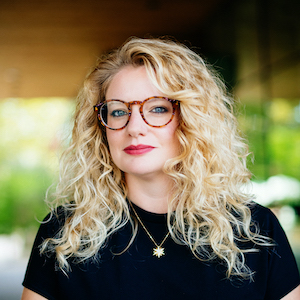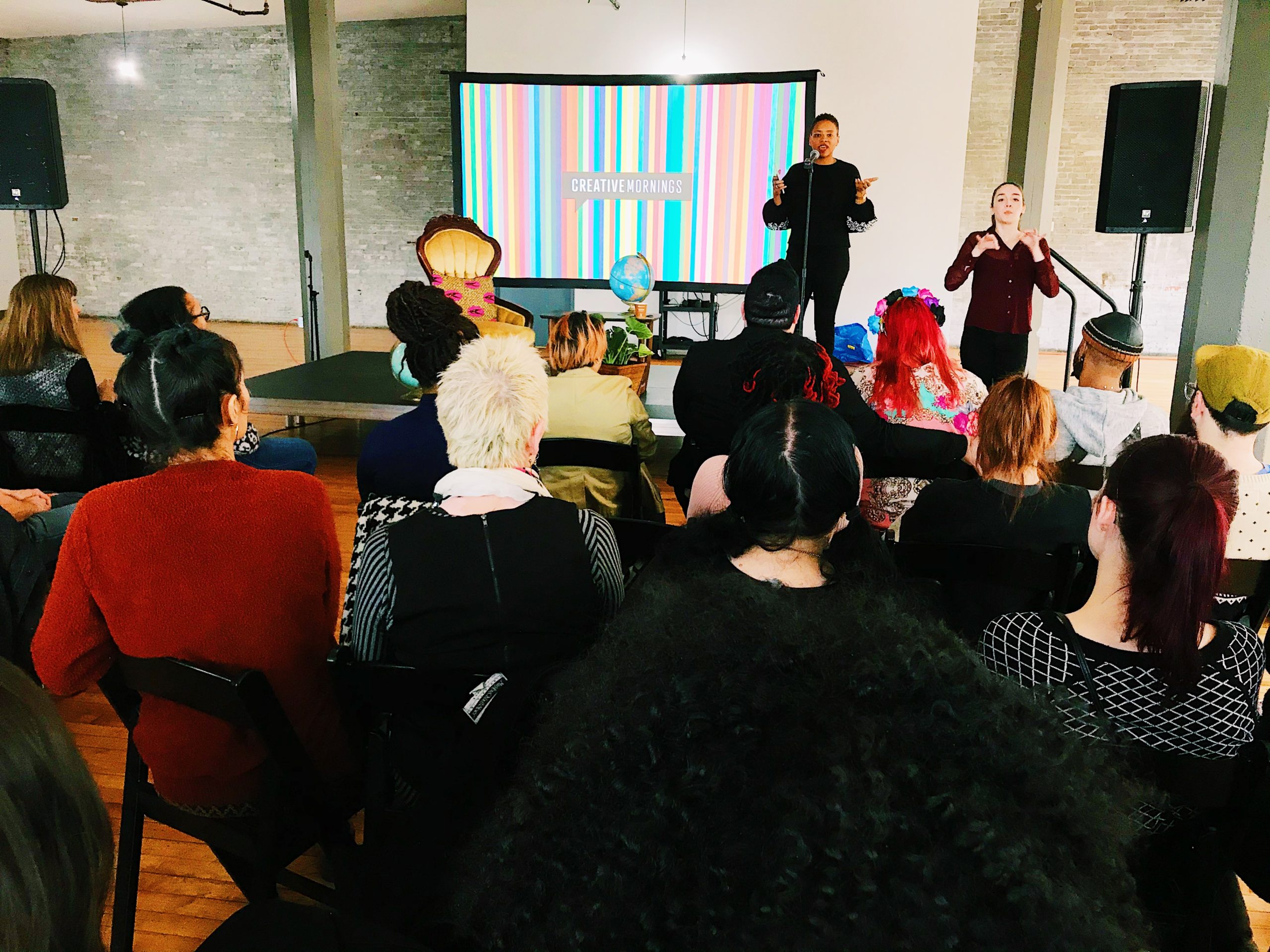When Jess Solomon took the stage at Studio 4 in February for the latest installment of Creative Mornings Baltimore, she stood in front of a cross-section of Baltimore. Maybe it was the month’s theme for the local edition of the international event series for creatives — INVEST — that had the room charged.
With deep experience in taking a creative approach to organizational development, Solomon leads the work to build out and execute the Robert W. Deutsch Foundation’s place-based grant making, launching new initiatives that work to ensure equitable impact in Baltimore. From growing up in West Baltimore now to the helm of one of the city’s most significant funding institutions, Solomon admitted her nerves, sharing that “invest” is a word she’s still coming to terms with. It’s a word standing between Baltimore’s White L and Black Butterfly, a word of have and have not, a word between need and the ability to give.
Creative Mornings brings together a crowd of creatives and entrepreneurs spanning across professions — from contemporary artists, filmmakers, hair stylists, to independent consultants, founders, entrepreneurs, small business owners — gathering for the connection of advice and community. Each month, a different topic chosen by one of the 214 international chapters, and hosted for free.
With a disclaimer that if you came to the talk to find out how to make or get money you were in the wrong place, Solomon reframed her talk: “When you decide to invest in yourself or a friend you’re investing in the future you want to see,” she said. “If we all thought like this we’d be better for it.”
Whether you’re a non-profit, an artist, or an entrepreneur, seeking funding, ready to write a check, volunteer your skills, or give the $5 bill in your pocket, she asked the audience to reconsider what they are valuing and why they are valuing it when they decide to invest from new perspectives.
Here are some key lenses that Solomon suggests using to frame investing as a community:
- “Money is not the only source of capital that we have at our resource.” Solomon reminded the audience that capital is your friends, network, family, and it’s what you grow and share, and what you give to others. Most importantly, it is yourself.
- “Your budget is not just numbers, it’s the story of your plan.” The budget is the first thing investors look at, not because they want to see if you’re financially smart, but because they want to know what your priorities are and how you are going to resource them effectively to execute your plan.
- “Investing is the best way to become a futurist.” Early in her career Solomon had the opportunity to go to a training that she couldn’t afford but that she knew would change her life. In small contributions from friends and family she was able to raise the money. Investing is believing in someone else.
- “You have to remember the vision even when you can’t see it.” — When you make a decision to invest, whether it is time, money, or effort, not everyone is going to understand. You have to think about yourself as exponential, you have to believe and carry the vision even when it is hard. It takes community to do that.
- “Reciprocity and generosity are practices, they are active and can grow.” — Particularly for investors across economic and access disparities, when you are in the business of investing, it is never a one way street. You have to be invested in what your responsibilities are to the people you work on behalf of.
In closing, Solomon brought the room together in an acknowledgement that this work is complicated, everyone is doing their best.
“As a human being investing in other human beings, I think about what brings me to that work. I think about my grandparents’ dreams. I think about my friends who decided to invest in my future. I think about the importance of using our voices even when we are afraid,” she said. “But what does it mean when we get to bring our whole selves to that work?”
It’s a reminder for the entrepreneurial community: Whether you are a founder, supporter, technologist, or VC, everyone is investing in something. Your why — your why you do the thing that you do — makes the most compelling story for any investment.
For startup founders and creatives that invest themselves, their families, and their money into their work, or for ecosystem supporters and funders that invest their time, resources, cash, and energy into the community — when we say investment in tech — what is our why? What is the real means through which we choose to invest in someone else? With our investments, what future are we deciding to see?
###
While Creative Mornings Baltimore IRL may be postponed for March and April, connect with the CreativeMornings/Baltimore Talk Club. Previous talks are curated and you can join in the conversation with others WFHers to keep the inspiration flowing.
In-person Creative Mornings are scheduled to be back for the summer. Mark your calendars for June 26, 2020 with Steve Chu of Ekiben to talk about IDENTITY and August 28, 2020 with Irena Stein of Alma Cocina Latina to discuss PURPOSE.
To learn more about Jess and her work visit her website.
Join the conversation!
Find news, events, jobs and people who share your interests on Technical.ly's open community Slack

Baltimore daily roundup: Gen AI's software dev skills; UpSurge Tech Ecosystem Report; MD service year program

Baltimore daily roundup: Mayoral candidates talk tech and biz; a guide to greentech vocabulary; a Dutch delegation's visit

Baltimore daily roundup: An HBCU innovation champion's journey; Sen. Sanders visits Morgan State; Humane Ai review debate


